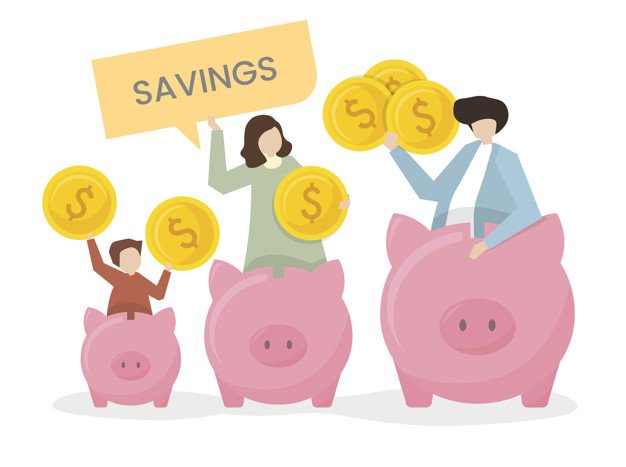In every person’s life, there is a time when we start to set different decisions for ourselves. Someone is probably thinking about quitting smoking, someone else starts commuting to work by bike and somebody wants to find more time for the family. If you don’t really know what to do, I strongly encourage you to save money. Each of us likes to be aware of the amount of money in our bank account, wallet or just likes to look at the savings we have accumulated. I know that it’s easy to say and much harder to implement, so I’ve prepared some useful tips for you on how to save more money every day.
For starters, you can go shopping only with a list of what you really need to buy, it will protect you against spontaneous and ill-considered purchases of products you don’t even need in the first place. Remember that it’s essential to have a strong will and to stick to the plan.
Eco-driving:
If you’ve got a car, economical driving is a great way to save fuel. Keeping your RPMs low and not stopping quickly at the last moment but rather slowly rolling towards the red lights can save you a lot of fuel.
Verification of the bank costs of our account:
it is worth checking from time to time whether it’s not too expensive to have a personal account in your bank by chance. In times of fierce competition on the market between the best national banks, there is no problem with finding a better offer.
Less TV, more movement:
Instead of wasting time on the couch, it is better to move, even if you walk. Your weight will drop, your mood will improve, and your wallet will become a little thicker.
Planning:
Planning everything that can be scheduled is an easy matter for the perfectionists. They love to have everything arranged and prepared as early as possible. Planning avoids sudden and massive expenses. A simple example: a school layette. It has always been known that the school year begins on 1 September, so there is no problem to start saving money to buy books or utensils a few months in advance. It is also possible to plan holidays well in advance, a large amount of time will help us to save money.
Bills:
Negotiating with utility providers, current bills consume a large part of every family’s budget, so I see no reason not to try to reduce them. It is worth checking whether it is worth changing electricity supplier. I also encourage you to regularly check the offers of mobile phone operators or Internet providers. If it is cheaper somewhere, it is worth trying to negotiate better conditions with the current company.
Motivation:
Mobilizing yourself to make savings without a goal is, in my opinion, a little pointless. That is why I think it is worthwhile to find the motivation to save. It can be a dream trip, buying a new car or securing your child’s future. Knowing what you are saving for makes it easier to get down to business.
The internet:
Learning foreign languages over the Internet, there is no cheaper option, and with a little bit of self-denial, you can achieve great results.
Car-sharing:
Carpooling, a.k.a. joint commuting to work, school or university and all other places you just have to get to. Just ask your co-workers or your neighbors. Many carpooling services unite the interests of people and you can make new friendships this way! Do not forget that it’s a very environmentally friendly – look at the other cars when you commute to work. They have at least 4 seats and most of the time only 1 person is in the car. Just imagine how many cars would disappear from the roads if four people wherein one car instead of one person in each car. This is just a waste of gasoline.
Many people are still afraid of credit cards, but using best credit cards wisely saves a lot of money, not just on Moneybookers.
Food:
No more wasted food! Statistically, the family throws away food worth 20 euros every month. It is hard to imagine a greater waste. So it’s better to buy less and possibly buy the missing products later than to push the fridge and then throw away the overdue food.
Shopping:
As we know, there are many examples of smart and rational shopping. For example buying winter tires in the summer or Christmas presents… just after Christmas.
Be your own dentist:
Taking care of your teeth, we can guess that it is always much cheaper to spend a couple of dollars on a toothpick and a toothpaste than waste hundreds and possibly thousands of dollars on treating them.
Healthy diet instead of supplements:
Europe is the leader in the field of buying all kinds of medicines and pharmaceuticals. We spend vast amounts of money on it and it’s just a waste of money. Why buy a vitamin C supplement if you can, for example, drink fresh juices or eat fruit? It goes out cheaper, and certainly tastier and healthier.
Looking through your wardrobe:
Going shopping for clothes only to have fun with your friends is a very simple way to waste tremedous amounts of money. If you think you need new clothes, it’s a good idea to review your wardrobe first and assess whether something is missing in it. It can be an opportunity to get rid of damaged or too small things.
Subscribing to newsletters, I am myself registered for newsletters of several shops with computer components and regularly get codes for discounts of 10% or 20% each.
For post-season holidays, it is better to plan your holidays in June or September, for example. Prices of trips and hotels are much lower then than in July and August, and in many countries, the weather is still guaranteed to be at least good.
Moneybox – an old but still effective way to save money. I have it myself and for years I have been throwing little things into it, which are in my wallet. This way, without any effort, I can raise a lot of money that otherwise would go to waste.
Currency exchanges at internet exchange offices are much cheaper than permanent ones, not to mention banks.
I am of the opinion that a lot of work in your home can be done by yourself. For example, painting walls, grouting, or installing panels.
Making sandwiches to work is sometimes a nuisance, but it pays off. A healthy lunch will satisfy hunger better than an expensive snack from a scrubbing machine or fast food restaurant.
Buying second-hand items:
I’m not only talking about clothes, but also computer games and electronic equipment. A great way to save a lot of money is to buy a new car, which officially is no longer new. Showroom cars or the ones that served as a test modelsare almost in a perfect conditionjust like the new ones, but 20-30% cheaper.
Drinking water instead of carbonated drinks is not only much cheaper, but it is also incomparably healthier. If you want to save on buying water, consider installing a reverse osmosis filter in your home.
Selling unnecessary items – something to us is just rubbish, but it may be useful to someone else – to such an extent that they will be ready to pay for it.
As we can see to save you don’t need to do amazing things, it is enough to focus on simple activities that we do every day and think about what to do to save on it. Above I presented a few methods of saving more money, but each of us can conclude what level of his monthly revenues he wants to keep and what goals he assumes to save his money. Wouldn’t it be worth to just start and try an check for yourself which method works for you? Let’s start today and not tomorrow.
Read Also:






















